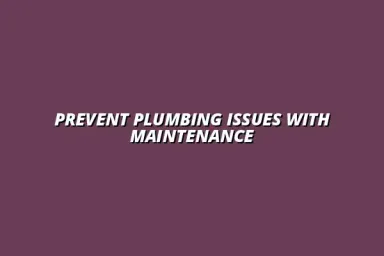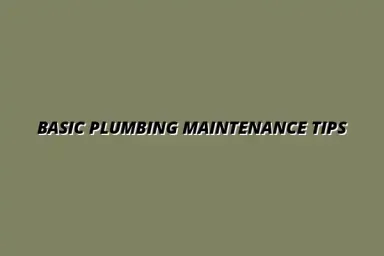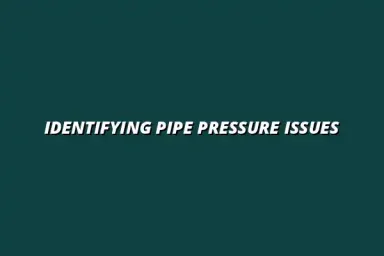Understanding the Challenge of Broken PVC Pipes Underground
Broken PVC pipes underground can lead to significant plumbing issues, impacting water flow and causing potential damage to surrounding areas. These challenges often require immediate attention, as they can disrupt daily life and lead to costly repairs if not addressed promptly. To effectively manage these situations, it’s crucial to understand the various aspects of PVC pipe integrity and the implications of any damage.
When PVC pipes are compromised, it not only affects the plumbing system but can also lead to environmental concerns, such as water contamination. The integrity of these pipes is vital for maintaining both efficient water delivery and the overall health of your plumbing infrastructure. Understanding these challenges is the first step toward implementing effective repair strategies. If you're experiencing issues with your drainage system, consider checking out tips on how to clear blocked garden drainage pipes.
The Importance of PVC Pipe Integrity in Plumbing Systems
The integrity of PVC pipes plays a crucial role in the overall health of plumbing systems. Strong, intact pipes ensure consistent water flow, prevent leaks, and reduce the risk of costly water damage. When these pipes are compromised, the entire plumbing system can suffer, leading to inconvenience and increased repair costs.
Moreover, maintaining the integrity of your PVC pipes helps preserve the quality of the water supply. Integrity issues can lead to contaminants entering the water system, posing health risks to those who consume or use the water. Regular inspections and maintenance can help identify weaknesses before they turn into significant problems. For example, a cold water heater issue could indicate a wider problem.
- Consistent water flow
- Prevention of leaks
- Reduction of costly damage
- Preservation of water quality
Common Issues Caused by Broken PVC Pipes
Broken PVC pipes can cause several common issues, including leaks, decreased water pressure, and increased utility bills. When a pipe breaks, water can escape, leading to flooding in the surrounding areas and significant damage to property. In addition, reduced water pressure can affect the performance of fixtures and appliances throughout your home.
Another issue is the potential for mold and mildew growth due to prolonged water exposure. This not only poses a risk to the structural integrity of your home but can also lead to health issues for those living there. Addressing any signs of broken PVC pipes early can help mitigate these risks and ensure a safe living environment. Sometimes, a seemingly simple issue like a leaky kitchen faucet can be a symptom of a larger problem.
Signs Indicating PVC Pipe Damage
Identifying the signs of PVC pipe damage early can save homeowners a lot of trouble down the road. Some common indicators include:
- Wet spots or puddles in your yard
- Unexplained increase in water bills
- Decreased water pressure
- Strange noises in the plumbing system
Being attentive to these signs can aid in the prompt detection of a problem. If you notice any of these issues, it’s essential to investigate further to determine if a PVC pipe repair is necessary. Taking action early can prevent more extensive damage and costly repairs. If you suspect tree roots are causing damage, learn how to prevent tree roots from damaging pipes.
Tools and Materials Required for PVC Pipe Repair
When it comes to repairing broken PVC pipes, having the right tools and materials is essential. Whether you're a DIY enthusiast or a professional plumber, equipping yourself with the proper equipment will make the repair process smoother and more efficient. Let’s explore the necessary tools and materials that will help you tackle these repairs effectively.
Organizing your toolkit can also save you time and frustration during the repair process. Knowing what you need ahead of time means you can gather everything before starting the job, preventing unnecessary delays. Let’s dive into the specifics of the tools that are pivotal for successful PVC pipe repairs!
Addressing Common Questions About PVC Pipe Repair
The world of plumbing can be tricky, especially when it comes to repairing PVC pipes. Many homeowners have questions that arise during or after a repair, and it's important to address these to ensure peace of mind. From the lifespan of repairs to figuring out when to call in the pros, let’s dive into some common queries. Sometimes, it's necessary to decide whether to repair or replace your pipes.
One of the most frequently asked questions is, "How long does a PVC pipe repair last?" The answer isn't straightforward, as it depends on various factors, which we will explore next. Understanding these elements can help you better manage your plumbing system and anticipate future needs.
How Long Does a PVC Pipe Repair Last?
The longevity of a PVC pipe repair can vary widely based on several important factors. Knowing what influences how long your repairs will hold up can be key to effective plumbing maintenance. Here are some of the main aspects:
- Quality of Materials Used: Higher quality adhesives and sealants generally lead to longer-lasting repairs.
- Environmental Conditions: Soil type, moisture levels, and temperature fluctuations can impact repair durability.
- Installation Technique: Proper installation practices are essential for ensuring that repairs stick.
- Usage and Pressure: Pipes under constant pressure or heavy usage may experience wear faster.
By keeping these factors in mind, you can make more informed decisions about your plumbing repairs. It’s always a good idea to check your repairs periodically to catch any issues early! Regular maintenance, such as annual drain inspection and cleaning, is essential.
What to Do if the Damage is Extensive?
If you find yourself facing extensive damage to your PVC pipes, knowing when to call for help is critical. Sometimes, DIY repairs may not suffice, and it’s best to consult a professional. For example, if you need a plumber in the Birmingham area, you can find one here. Here’s how to determine if you need expert assistance:
- Multiple Breaks: If there are several breaks or leaks in different sections, it might be time to bring in a pro.
- Severe Cracking: Deep cracks or significant structural issues may require specialized repair techniques.
- Persistent Issues: If repairs are failing repeatedly, it’s a sign that a more comprehensive fix is needed.
- Upgrading Needs: Sometimes, extensive damage indicates the need to upgrade your entire plumbing system.
Recognizing the signs of extensive damage can save you time and money in the long run. Don't hesitate to reach out to a professional if you're unsure how to proceed!
Maintaining Your PVC Pipes to Prevent Future Breaks
Once your PVC pipes are repaired, the next step is to ensure they stay in good condition. Regular maintenance is key to avoiding future issues and extending the lifespan of your plumbing system. There are several effective practices you can follow to maintain your pipes.
After all, prevention is always better than cure! In this section, we will cover simple steps to keep your PVC pipes healthy and functional.
Regular Inspection and Maintenance Tips for PVC Pipes
To keep your PVC plumbing in top shape, regular inspections are essential. Here are some maintenance tips that can help you:
- Check for Cracks and Leaks: Regularly inspect your pipes for any visible damage.
- Monitor Water Pressure: High water pressure can strain pipes, so keep an eye on your system.
- Clear Debris: Make sure to clean out any debris that could block your pipes.
- Watch for Signs of Wear: Look for signs of discoloration or deformation in your pipes.
By keeping your eyes peeled for these signs, you can catch small issues before they become major problems! Regular maintenance really pays off.
Upgrading Your Plumbing System: When is it Necessary?
Sometimes, despite your best maintenance efforts, it may be clear that an upgrade is due. Knowing when to overhaul your plumbing system can save you from continuous headaches down the line. Here are some indicators:
- Frequent Repairs: If you are constantly repairing pipes, it may be time for a full upgrade.
- Outdated Materials: Older PVC types may not perform as well as newer options.
- Changes in Usage: If your household has grown, your current plumbing may not meet the demand.
- Increased Water Bills: A spike in your water bill can indicate leaks or inefficiencies in your system.
Being aware of these signs can help you make informed decisions about your plumbing needs. Upgrading might seem daunting but can significantly enhance your home’s plumbing efficiency!
Final Thoughts on Repairing Underground PVC Pipes
Repairing underground PVC pipes can be a daunting task, but it’s manageable with the right approach! Throughout the process, it’s essential to remember the key steps: identify the damage, prepare for repairs, execute the fix, and finally, maintain your system. Keeping these steps in mind will lead to successful repairs.
Ultimately, ensuring the integrity of your PVC pipes is vital for a well-functioning plumbing system. Addressing issues early and maintaining your pipes can save you from significant problems down the road!
Encouraging Proactive Maintenance for Homeowners
As a homeowner, investing in knowledge about your plumbing care can be one of your best defenses against future issues. Stay informed about maintenance practices and don’t hesitate to brush up on your skills. After all, a little knowledge can go a long way in preventing plumbing disasters!
Being proactive about your PVC pipe maintenance means you’ll be prepared for whatever comes your way. So, keep those tools handy, and don’t let your plumbing worries get the best of you!

 Kiran Almasi
Kiran Almasi

